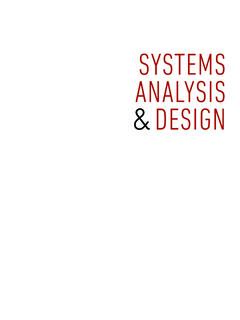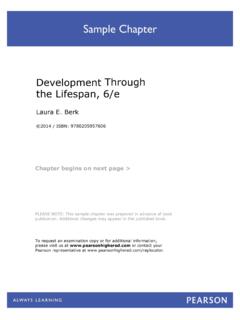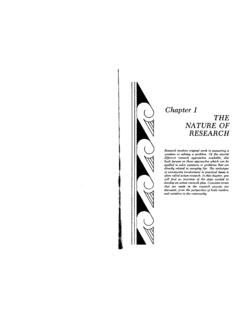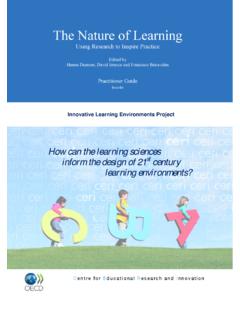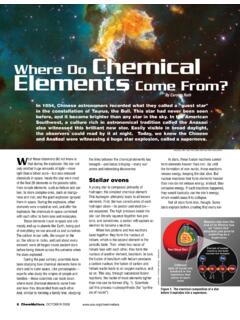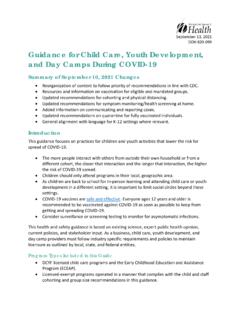Transcription of The Nature of Morality - Pearson
1 1 Morality claims our lives. It makes claims upon each of us that are stronger than the claims of law andtakes priority over self-interest. As human beings living in the world, we have basic duties and obliga-tions. There are certain things we mustdo and certain things we must notdo. In other words, there is anethical dimension of human existence. As human beings, we experience life in a world of good and eviland understand certain kinds of actions in terms of right and wrong. The very structure of human exis-tence dictates that we must make choices. Ethics helps us use our freedom responsibly and understandwho we are. And, ethics gives direction in our struggle to answer the fundamental questions that askhow we should live our lives and how we can make right to the Chapter Audio on you have read this chapter, you should be able philosophyand explain the relationship of ethics to key terms concerning ethics or the various approaches to the study of what Morality is and how it differs from aesthetics, nonmoral behavior, and to whom Morality some idea of where Morality comes between Morality and the between Morality and why human beings should be IS PHILOSOPHY AND ETHICS RELATIONSHIP TO IT?
2 Philosophyliterally means love of wisdom, from the Greek words philiameaning love or friendship andsophiameaning wisdom. The following three areas of philosophy will be our major concern in this book:epistemology(the study of knowledge), metaphysics(the study of the Nature of reality), and ethics(the study of Morality ). Aesthetics(the study of values in art or beauty) and logic(the study of argumentand the principles of correct reasoning) are two additional areas of philosophy that constitute its fivemajor 1 The Nature of 7/1/11 3:31 PM Page 12 Chapter 1 The Nature of MoralityEpistemology deals with the following questions: What is knowledge? What aretruth and falsity, and to what do they apply? What is required for someone to actuallyknowsomething? What is the Nature of perception, and how reliable is it?
3 What s thedifference between knowledge and belief? Is there anything such as certain knowledge ?From time to time throughout this book, epistemological questions will be discussed,especially in Chapter 5, which deals with absolutes and is the study of the Nature of reality, asking the following questions:What is the Nature of reality and of the things that exist? Specifically, such questions as thefollowing are asked: Is there really cause and effect and, if so, how does it work? What isthe Nature of the physical world, and is there anything other than the physical, such asthe mental or spiritual? What is the Nature of human beings? Is there freedom in reality, oris everything predetermined? Here again, we will deal with some of these questionsthroughout the book, but especially in Chapter 5 (Are there any absolutes, or is every-thing really relative?)
4 And Chapter 6 (Is there any such thing as freedom, or are all thingsin reality predetermined?)Ethics, our main concern, deals with what is right or wrong in human behavior andconduct. It asks such questions as what constitutes any person or action being good,bad, right, or wrong and how do we know (epistemology)? What part does self-interestor the interests of others play in the making of moral decisions and judgments? What the-ories of conduct are valid or invalid and why? Should we use principles or rules or lawsas the basis for our choices, or should we let each situation decide our Morality ? Arekilling, lying, cheating, stealing, and certain kinds of sexual acts right or wrong, and whyor why not?As you can see, the above three areas of philosophy are related and at times over-lap, but each one is worthy of concentrated study in itself.
5 The major concern in thisbook, as its title suggests, is ethics, and before going any further, it is important to definesome key terms used in any discussion of ethics or OF KEY TERMSE thical, Moral, Unethical, ImmoralIn ordinary language, we frequently use the words ethicaland moral(and unethicalandimmoral) interchangeably; that is, we speak of the ethical or moral person or act. On theother hand, we speak of codes of ethics, but only infrequently do we mention codes ofmorality. Some reserve the terms moraland immoralonly for the realm of sexuality anduse the words ethicaland unethicalwhen discussing how the business and professionalcommunities should behave toward their members or toward the public. More com-monly, however, we use none of these words as often as we use the terms good,bad,right, and wrong.
6 What do all of these words mean, and what are the relationshipsamong them?Ethicscomes from the Greek ethos, meaning character. Moralitycomes from theLatin moralis, meaning customs or manners. Ethics, then, seems to pertain to the individ-ual character of a person or persons, whereas Morality seems to point to the relationshipsbetween human beings. Nevertheless, in ordinary language, whether we call a personethical or moral, or an act unethical or immoral, doesn t really make any significant differ-ence. In philosophy, however, the term ethicsis also used to refer to a specific area ofstudy: the area of Morality , which concentrates on human conduct and human we speak of people as being moral or ethical, we usually mean that they aregood people, and when we speak of them as being immoral or unethical, we mean thatthey are bad people.
7 When we refer to certain human actions as being moral, ethical,immoral, and unethical, we mean that they are right or wrong. The simplicity of 7/1/11 3:31 PM Page 2 Chapter 1 The Nature of Morality3definitions, however, ends here, for how do we define a right or wrong action or a goodor bad person? What are the human standards by which such decisions can be made?These are the more difficult questions that make up the greater part of the study of moral-ity, and they will be discussed in more detail in later chapters. The important thing toremember here is that moral,ethical,immoral, and unethicalessentially mean good,right,bad, and wrong, often depending upon whether one is referring to people them-selves or to their OF GOOD, BAD, RIGHT, WRONG, HAPPINESS, OR seemsto be an empirical fact that whatever human beings consider to be good involves happi-ness and pleasure in some way, and whatever they consider to be bad involves unhappi-ness and pain in some way.
8 This view of what is good has traditionally been called hedonism. As long as the widest range of interpretation is given to these words (fromsimple sensual pleasures to intellectual or spiritual pleasures and from sensual pain todeep emotional unhappiness), it is difficult to deny that whatever is good involves at leastsome pleasure or happiness, and whatever is bad involves some pain or element involved in the achievement of happiness is the necessity of taking thelong-range rather than the short-range view. People may undergo some pain or unhappi-ness in order to attain some pleasure or happiness in the long run. For example, we will putup with the pain of having our teeth drilled in order to keep our teeth and gums healthy sothat we may enjoy eating and the general good health that results from having teeth that arewell maintained.
9 Similarly, people may do very difficult and even painful work for two daysin order to earn money that will bring them pleasure and happiness for a week or , the term goodshould be defined in the context of human experience andhuman relationships rather than in an abstract sense only. For example, knowledge and power in themselves are not good unless a human being derives some satisfaction fromthem or unless they contribute in some way to moral and meaningful human are otherwise about actions that will bring a person some good but will cause pain toanother, such as those acts of a sadist who gains pleasure from violently mistreatinganother human being? Our original statement was that everything that is good will bringsome person satisfaction, pleasure, or happiness of some kind, but this statement doesnot necessarily work in the reverse that everything that brings someone satisfaction is necessarily good.
10 There certainly are malicious pleasures. Frankena states that whatever is good will also probably involve some kind or degree of excellence. 1He goes on to say that what is bad in itself is sobecause of the presence of either pain or unhappiness or of some kind of defect or lackof excellence. 2 Excellence is an important addition to pleasure or satisfaction in that itmakes experiences or activities better or worse than they would otherwise be. 3 Forexample, the enjoyment or satisfaction gained from hearing a concert, seeing a finemovie, or reading a good book is due, to a great extent, to the excellence of the creatorsand presenters of these events (composers, performers, directors, actors, and writers).Another and perhaps more profound example of the importance of excellence is that ifone gains satisfaction or pleasure from witnessing a well-conducted court case and fromseeing and hearing the judge and the lawyers perform their duties well, that satisfactionwill be deepened if the judge and the lawyers are also excellent people, that is, if they arekind, fair, and compassionate human beings in addition to being clever and is good, then, will probably contain some pleasure, happiness, and excel-lence, whereas whatever is bad will be characterized by their opposites: pain, unhappi-ness, and lack of excellence.





